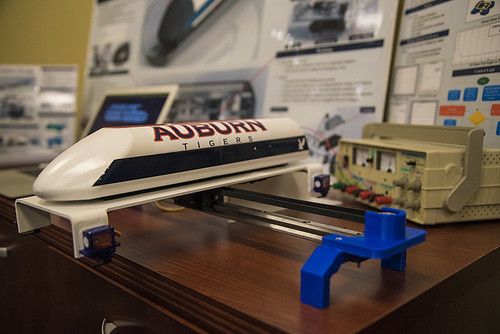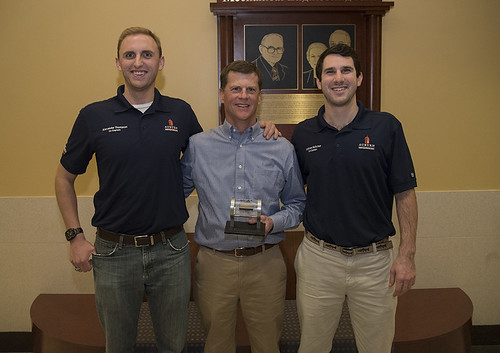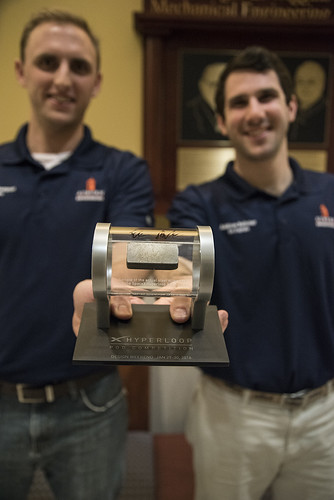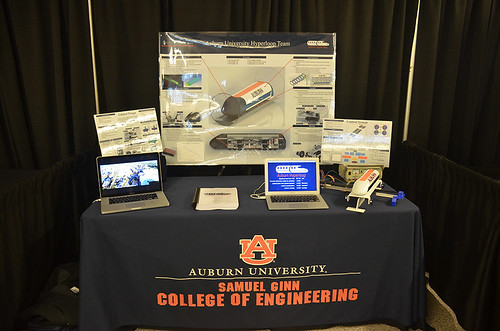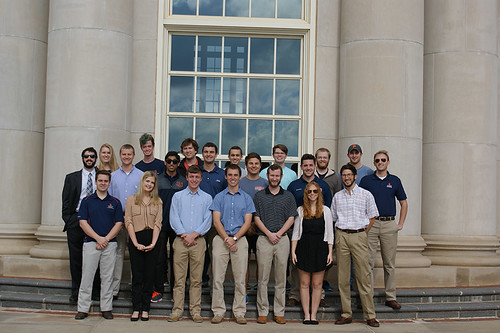Auburn engineering students want you to travel at 760 mph
Article body
It's 2016 and no one has discovered time travel yet, but Samuel Ginn College of Engineering students may have us traveling 760 miles per hour in the near future. Entrepreneur Elon Musk, known for his success with PayPal, Tesla Motors and most recently SpaceX, held an open competition in January for university students and engineering teams to design and build for his idea, the Hyperloop.
The Auburn Hyperloop Team (http://www.auhyperloop.com/), led by mechanical engineering students Addison Baitcher and Alexander Thompson, competed in the SpaceX Hyperloop Pod Competition Design Weekend at Texas A&M University and won two top awards: best overall subsystem in the subsystem design category and the design concept innovation award in the design only category.
The Hyperloop is a conceptual high-speed transportation system that consists of a pod in a low-pressure tube, allowing for travel speeds of up to 760 miles per hour. Musk's proposed model would make commutes between San Francisco and Los Angeles cheaper and more efficient than driving or flying, and has the potential for global use.
Baitcher, senior in mechanical engineering, was interning for Tesla Motors in the summer of 2015 when he first heard about the Hyperloop. When he reached out to the Mechanical Engineering Department in July, he was put in contact with Alexander Thompson, senior in mechanical engineering, and they decided to create the Auburn Hyperloop Team.
"I knew that there were going to be some great universities entering this competition, and Alex and I were convinced we could compete at the level of some of these top tier schools," he said. "I felt like with the right team and the right leadership, that Auburn could really deliver a great product that would be competitive."
Captains Baitcher and Thompson recruited approximately 50 students to join their team and had each department in the college represented. They also recruited Associate Professor Rick Williams as their faculty sponsor, although he initially hesitated at the idea.
"When we first approached Dr. Williams about the idea, we were still seeking funding for a potential build, but that plan evolved over the first few months," said Thompson. "Though reluctant at first, he finally came around to the idea once Addison and I provided him with a detailed plan for a design only team."
The team was split into three divisions: mechanical, electrical and industrial. While enthusiasm for the project was high, the university administration was appropriately hesitant to immediately jump on board, given the nature and complexity of the project, as well as the lack of details surrounding the competition and its competitors.
"The Hyperloop competition was new, and when first announced, very vague," said Williams. "With an extremely short project timeline, obtaining funding, space and other resources was going to be very challenging. On top of these challenges, the budget to successfully design and build a pod was going to be more than $100,000."
Fortunately for Auburn Hyperloop, the competition offered a design only category and Williams advised Baitcher and Thompson that their team's efforts would be better spent working on a great design, rather than getting delayed in fundraising and setting up shop space to build.
"The team still needed funding to travel to the competition and I worked with the captains to pull together a travel proposal and budget," said Williams. "They set up meetings with the associate dean and several department heads and presented their proposal. Once the college committed funding, the departments followed along with matching funds."
With limited time and resources to prepare for competition, the team focused on developing their overall design with a specific detailed subsystem design. The students and Williams were interested in using Arx Pax technology, and within the award-winning design, they were able to utilize these hover engines for magnetic levitation, create and integrate mechanical landing gear and have an aircraft fuselage structural design.
"We started designing by simply reading. Papers, books, technical documents—whatever we could get our hands on that would give us a jumping off point," said Baitcher. "The more we read, the more refined our design became. The main focus of the design was a control system that worked to keep the pod centered on the track as it traveled. This type of system could be adapted and potentially implemented in applications such as rounding corners and turning."
A group of Auburn Hyperloop team members traveled to College Station, Texas, with their captains and advisor to present at the SpaceX-sponsored design weekend. The team was proud to walk away as winners of the best overall subsystem and the design concept innovation award, along with Elon Musk's signature on one award.
"This was a great experience for these students," said Williams. "It is a rare opportunity to be able to attend the first year of a major design competition and see how other teams approached the problem without having the bias of previous solutions. Auburn competed against 126 teams representing 21 countries and came home with two awards, besting some of the top engineering schools in the country. That is a testament to the team's vision, dedication and hard work. I could not be more proud of the accomplishments of the Auburn Hyperloop team and how well they represented Auburn."
The co-captains plan to attend the SpaceX Hyperloop Pod Competition in California this summer where pod prototypes will be on a test track. Although Baitcher will graduate this May, Thompson will be enrolled for the fall semester and will continue to be involved with the Auburn Hyperloop team, if another competition is announced by Musk.
"The Hyperloop is an extremely exciting concept," said Thompson. "I don't believe that there has ever been such an exciting open source idea that has been so widely collaborated on at this level. To be a part of this movement is truly humbling, and to do so well competing on an international scale is a testament to our team's dedication and knowledge. I see an extremely bright future and successful careers for each of our team members and I also see an exciting future for the Hyperloop. I look forward to the transformation of this competition into an annual event, as Musk hinted at during his speech at the competition and Auburn's continued participation."
Related Media
Related Links
Media interested in this story can contact Communications Director Preston Sparks at (334) 844-9999 or preston.sparks@auburn.edu.
Auburn University is a nationally ranked land grant institution recognized for its commitment to world-class scholarship, interdisciplinary research with an elite, top-tier Carnegie R1 classification, life-changing outreach with Carnegie’s Community Engagement designation and an undergraduate education experience second to none. Auburn is home to more than 30,000 students, and its faculty and research partners collaborate to develop and deliver meaningful scholarship, science and technology-based advancements that meet pressing regional, national and global needs. Auburn’s commitment to active student engagement, professional success and public/private partnership drives a growing reputation for outreach and extension that delivers broad economic, health and societal impact.



